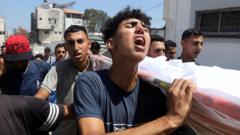With a ceasefire continuing for a second day, life in both countries begins to normalize amidst an atmosphere of anxiety and uncertainty.
Israel-Iran Ceasefire: A Fragile Return to Daily Life Amid Lingering Fears

Israel-Iran Ceasefire: A Fragile Return to Daily Life Amid Lingering Fears
As a ceasefire persists, people in Israel and Iran cautiously resume their routines while grappling with the trauma of recent conflict.
As the ceasefire between Israel and Iran extends into its second day, both nations are tentatively stepping back into a semblance of normal life, albeit with the shadows of recent conflict still looming large. Schools in Israel, previously converted into bomb shelters, are welcoming back students, while internet access in Iran is gradually being restored after a two-week blackout during the hostilities.
In Israel, workers are returning to their jobs as the military has lifted restrictions on nonessential personnel. Conversely, many residents of Tehran who sought safety from relentless Israeli airstrikes are cautiously venturing back to their homes. Yet, a pervasive sense of dread remains, particularly in Iran, where citizens fear the aftermath of the war could escalate into government crackdowns on dissent.
“I fear both the war and the ceasefire equally,” lamented Maryam, a 35-year-old from Bandar Anzali, a coastal city on the Caspian Sea. “We know the mullahs will seek revenge after feeling humiliated.” Her sentiments reflect a broader apprehension among Iranians, who, speaking under anonymity, voiced their distress at the possibility of growing repression in the wake of a ceasefire.
The complexities of resuming everyday life in both nations are underscored by the unsettling conditions the conflicts have created, leaving citizens to navigate their return to normalcy under the cloud of potential retribution and instability.
In Israel, workers are returning to their jobs as the military has lifted restrictions on nonessential personnel. Conversely, many residents of Tehran who sought safety from relentless Israeli airstrikes are cautiously venturing back to their homes. Yet, a pervasive sense of dread remains, particularly in Iran, where citizens fear the aftermath of the war could escalate into government crackdowns on dissent.
“I fear both the war and the ceasefire equally,” lamented Maryam, a 35-year-old from Bandar Anzali, a coastal city on the Caspian Sea. “We know the mullahs will seek revenge after feeling humiliated.” Her sentiments reflect a broader apprehension among Iranians, who, speaking under anonymity, voiced their distress at the possibility of growing repression in the wake of a ceasefire.
The complexities of resuming everyday life in both nations are underscored by the unsettling conditions the conflicts have created, leaving citizens to navigate their return to normalcy under the cloud of potential retribution and instability.























